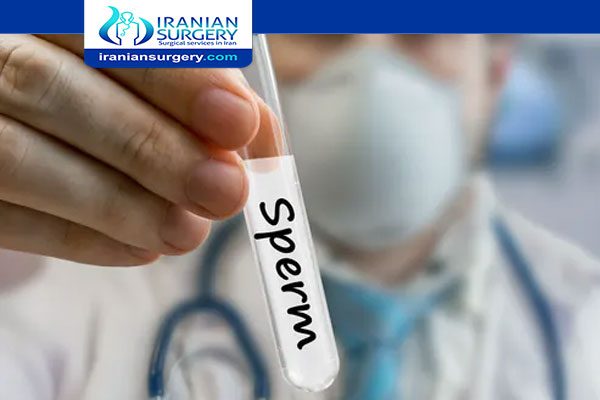Sperm Donation process in Iran

What is a Sperm Donor?
Sperm donation is a procedure in which a man donates semen — the fluid containing sperm that is released during ejaculation — to help an individual or a couple conceive a baby.
Donated sperm can be injected into a woman's reproductive organs (intrauterine insemination) or used to fertilize mature eggs in a lab (in vitro fertilization). The use of donated sperm is known as third-party reproduction.
A man who makes a sperm donation can be known or anonymous to the recipient. Sperm donations made to a known recipient are called directed donations.
Before you can donate sperm, you must be screened for medical conditions and other risk factors. It's also important to understand the possible emotional, psychological and legal issues of sperm donation.

About Iranian Surgery
Iranian surgery is an online medical tourism platform where you can find the best gynaecologists and obstetricians in Iran. The price of an Infertility treatment in Iran can vary according to each individual’s case and will be determined based on in-person assessment with the doctor.
For more information about the cost of Sperm Donor in Iran and to schedule an appointment in advance, you can contact Iranian Surgery consultants via WhatsApp number 0098 901 929 0946. This service is completely free.
Read more about : Is Surrogacy allowed in Iran?
Read more about : PGD in Iran
Read more about : PGS in Iran.
Read more about : Ivf with donor eggs process in Iran
Before Sperm Donor
Why it's done
Why do some people need donated sperm?
Sperm donation is done to help an individual or a couple conceive a baby. You might choose to make a sperm donation to help those who are unable to conceive — such as a woman who doesn't have a male partner or a couple experiencing male infertility.
Donated sperm (sperm not from your partner) can be used in many types of fertility treatment. The donated sperm is used to fertilize an egg either inside the woman's body (IUI) or outside the body (IVF).
Sperm donation can be considered in the following circumstances:
. Single women who wish to conceive without a partner
. Female same-sex couples
. In cases of azoospermia (lack of sperm in the ejaculate)
. For avoidance of genetic diseases which may be passed on from the male partner
. After recurrent ICSI treatment failures with poor quality sperm
If you donate semen to a sperm bank, you'll likely be paid for each donation that passes the sperm bank's screening process. Payment is intended to compensate you for your time and any related expenses. The amount is typically low enough that money isn't the main incentive for donating.

Risks
There are no health risks associated with sperm donation.
Who is a candidate for using a sperm donor?
Both single people and couples are candidates for sperm donors. For example, a same-sex female couple or a single woman may also decide to use a sperm donor.
In the case of heterosexual couples, if a male partner is struggling with infertility (or if both male partners have infertility issues), the two parents-to-be may decide to use a sperm donor, but it’s rarely a first line option, since issues with sperm can often be overcome with in vitro fertilization.
Am I eligible to donate my sperm?
Sperm donor requirements
Men who want to make sperm donations — including those who are known to recipients — should complete these screenings:
. Age. Most sperm banks require donors to be between the ages of 18 and 41. Some sperm banks set an upper age limit of 34.
. Physical exam. The exam will include taking samples of your blood and urine to test for infectious diseases, such as HIV. If you become a regular sperm donor, you'll need to have physical exams every six months while you provide sperm donations. You'll be asked to report any changes in your health.
. Semen testing. You'll need to provide several samples of your semen. Before providing each sample, you'll likely be asked to abstain from ejaculation — either through sex or masturbation — for at least 48-72 hours. The samples will be analyzed for sperm quantity, quality and movement.
. Genetic testing. A blood sample will be analyzed to see if you're a carrier of any genetic conditions. Ask individual sperm banks which tests they perform, as some banks conduct more-extensive testing than others.
. Family medical history. You'll need to provide details about the medical history of at least two previous generations of your family. A history that suggests the presence of a hereditary disease might disqualify you from donating sperm.
. Psychological evaluation. You'll likely be asked if you're concerned about your personal information being shared with your biological children or about future contact with them. If you're donating your sperm to someone you know, you'll likely be asked to talk about your relationship with the recipient. If you have a partner, counseling might be helpful for him or her, too.
. Personal and sexual history. You'll need to provide a detailed history of your sexual activities, drug use and other personal information to show whether you have risk factors for developing an infectious disease, such as HIV. You'll be asked to share detailed information about your personal habits, education, hobbies and interests. You might also be asked to provide pictures or videos of yourself or audio recordings of your voice.
If you test positive for any medical conditions during the screening process, you'll be notified and referred to treatment or counseling.
If you pass the screening process, you'll be asked to sign a consent form, which will likely state that you deny having any risk factors for sexually transmitted infections or genetic conditions. It's important to discuss whether you're open to contact from any child conceived with the help of your sperm.
What are the benefits of a sperm donor?
There are plenty of benefits to both parents-to-be and sperm donors alike:
. For women (or recipients of sperm donations):
. You’ll be able to conceive. For some women and couples, a sperm donation will help them fulfill their dream of having a child.
. Generally speaking, sperm donors are healthy. In order to become a sperm donor, men have to pass a number of genetic, psychological and medical screenings. Many banks also provide a photo of the donor, as an adult and as a child, and list attributes like height, hair color, IQ, education, hobbies and more.
. For men who are sperm donors:
. You’ll be compensated financially. Sperm donors do make a nominal fee.
. You’ll help a woman or couple conceive a child. This may be a last attempt to have a baby, so you're helping make dreams of parenthood come true.
. You’ll can get free health tests. Sperm banks do genetic and medical testing for their potential donors.
What are the disadvantages of using a sperm donor?
There are no significant health risks that are linked to sperm donation as long as the donor has been screened, but using a donor can have some downsides.
It’s up to you — or you and your partner — to determine whether the pros outweigh the possible cons.
. For women:
. Sperm donation can be a lengthy process. Typically, sperm banks freeze the sperm for at least 180 days before it’s used during insemination. During that time, the sperm undergoes more testing for infections like HIV, syphilis, Zika and others.
. The sperm donor might want to be involved in your child’s life. While the laws vary from country to country, a known sperm donor usually doesn’t have any parental rights or financial obligations to the child. Regardless of how involved (or uninvolved) you want the donor to be in your child’s life, you should consider hiring an attorney, who can draw up a contract that outlines both your and the donor’s rights and responsibilities. Agreements for anonymous donors also don’t typically give donors any rights or privileges. However, some sperm banks do offer identity release programs where a donor can choose to have their contact information released to the child at age 18, if the child requests it.
. You should see a counselor or therapist. We recommend that you (and your partner, if appropriate) meet with a qualified expert in psychological counseling before deciding to use a sperm donor. This way, you can discuss any concerns or questions you might have about parenting a child who was conceived with donor sperm — including whether you want to include a known donor in your child’s life. Meeting with a genetic counselor can also be helpful.
. You will only be able to use your donor’s sperm. Most clinics won’t allow you to “mix” the donor’s sperm with your partner’s. Keep in mind, too, that if you want to have more children in the future — and want them to share a biological father — you’ll need more sperm from the same source.
. For men who are sperm donors:
. You’ll have to abstain from ejaculation for at least two to three days before making the sperm donation.
. You may never meet your biological child. Or, on the other hand, your biological child may want to develop a relationship with you in the future.
. You may want to disclose that information later on. For example, you’ll have to decide whether you want to tell your future partner or children about your sperm donations.
. You'll want to undergo psychological counseling before becoming a sperm donor.
If you do decide to become a sperm donor or use a sperm donor to conceive, as long as you know what you're getting into and talk to the appropriate practitioners and counselors, there's a good chance all will go smoothly and it will be a rewarding experience for everyone involved.
How you prepare
If you're considering sperm donation, be mindful of the long-term impact of your decision.
If you're providing an anonymous donation, consider the following:
. Are you prepared to be the biological father of a child or multiple children whom you might never meet?
. What if children conceived with the help of your sperm donation wish to meet you one day?
. Will you tell your current or future family about your decision to donate sperm?
If you're providing a sperm donation to someone you know, consider hiring a lawyer to draft a contract that defines your financial and parental rights and obligations.
During Sperm Donor
What you can expect
Before sperm donation, you'll likely be asked again to abstain from ejaculation — either through sex or masturbation — for at least 2-3 days.
During the procedure
Sperm donation is typically done at a sperm bank. You'll provide a semen sample in a sterile cup through masturbation in a private room.
After Sperm Donor
After the procedure
The sample will be frozen (cryopreserved) and kept in quarantine for at least six months. Then you'll be tested again for infectious diseases, such as HIV.
If all of your test results are negative, your frozen sample will be thawed and sperm quantity, quality and movement will be evaluated again. Sperm samples from some men are more susceptible to damage during the freezing process than are others. Damage caused by the freezing process can also differ among samples from the same donor.
If your sperm meet the quality standards, you'll be selected as a donor. Keep in mind that most sperm banks limit the number of children your sperm can be used to conceive. However, specific guidelines and limits vary.
If you test positive for any medical conditions, you'll be notified and referred to treatment and counseling.


2 Comments
Hi I’m from Kuwait, I want transport my husband’s sperm from turkey to Iran for ivf. Because he doesn’t like to go to iran. Can you help me
Hello You can transport your husband’s sperm to Iran, but the quality of sperm decreases and we do not recommend it.